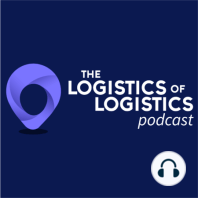29 min listen

Sustainability is a Competitive Advantage with Justin Goldston
Sustainability is a Competitive Advantage with Justin Goldston
ratings:
Length:
30 minutes
Released:
Dec 4, 2020
Format:
Podcast episode
Description
Sustainability is a Competitive Advantage with Justin Goldston Justin Goldston and Joe Lynch discuss why sustainability is a competitive advantage. As a professor, advisor, and supply chain practitioner, Justin has helped supply chain and logistics companies gain a competitive advantage through sustainability. About Justin Goldston Justin Goldston, Ph.D., is a Professor of Project and Supply Chain Management at Penn State University where he works closely with The Penn State Sustainability Institute to blend technology into organizational sustainability efforts. Goldston has over 20 years of experience working with organizations worldwide on business performance improvement, organizational change, and enterprise-wide digital transformation initiatives. Dr. Goldston is the author of multiple peer-reviewed journal articles on supply chain management and emerging technologies, of Critical Success Factors in ERP Implementations and is a five-time TEDx speaker. Goldston has also led and assisted in the development of Supply Chain Management, Sustainability, and Business Analytics programs at Georgetown University, Texas A&M University, the IUBH University of Applied Sciences in Germany, and North Carolina Wesleyan College. Goldston is also an executive on the International Standards Board at the International Supply Chain Education Alliance (ISCEA) and has evaluated Doctoral programs for the Department of Higher Education while serving on the Management Advisory Board at various higher education institutions. About Penn State University (PSU) Penn State is a top-ranked research university and Pennsylvania's only land-grant institution founded with a mission of high-quality teaching, expert research, and global service. In addition to its land-grant designation, Penn State is also a designated sea-grant, space-grant, and sun-grant university, one of only four U.S. academic institutions to be a member of all four federal research programs (along with Cornell University, Oregon State University, and the University of Hawaiʻi at Mānoa). With total annual enrollment totaling more than 97,500 graduate and undergraduate students and online through World Campus, Penn State is one of the largest universities in the United States and offers more than 160 majors. Key Takeaways: Sustainability is a Competitive Advantage Sustainability focuses on increasing social, economic, and environmental value-added. This is often referred to as the Triple Bottom Line (TBL) or Triple Top Line (TTL). Triple Bottom Line is a method of accounting that measures social and environmental performance in addition to financial results. Also referred to as people, planet, and profit. Triple Bottom Line is a business methodology that aims to reduce waste and negative aspects of business operations. Example: reducing water usage by installing low-flow toilets and sinks in your office. Sustainable Logistics involves examining the ecological, social, and financial impacts of logistics, transportation, and supply chain activities. Assessing inputs and outputs from the value chain: Inputs: trucks, fuel, materials, machines, human resources, etc. Outputs: products and services for customers, value generated, but also pollution and waste. The environmental benefits of sustainable logistics: Improved air quality. Reduction of noise pollution. Conservation of natural resources. Reducing landfill waste. Prevention of harmful emissions. The social benefit of sustainable logistics: Improved job satisfaction. Improved quality procedures. A healthier community. Public relations. Better company culture. Safer work environment. The financial benefit of sustainable logistics: Reduced costs of packaging, labor, fuel, utilities. The marketing benefits of sustainable logistics: New Customers Differentiation in a commoditized market Corporate Social Responsibility Better Public Relations Opportunity for Partnerships Consumers are increasingly buying from companies that de
Released:
Dec 4, 2020
Format:
Podcast episode
Titles in the series (100)
21st Century Sales Skills for Transportation and Logistics Professionals: Podcast Summary: In this podcast, welcomes to the show. Joe and Ann discuss their upcoming sales improvement program. The program, 21st Century Sales Skills for Transportation Logistics Professionals begins Wednesday, September 19th, 1:00... by The Logistics of Logistics